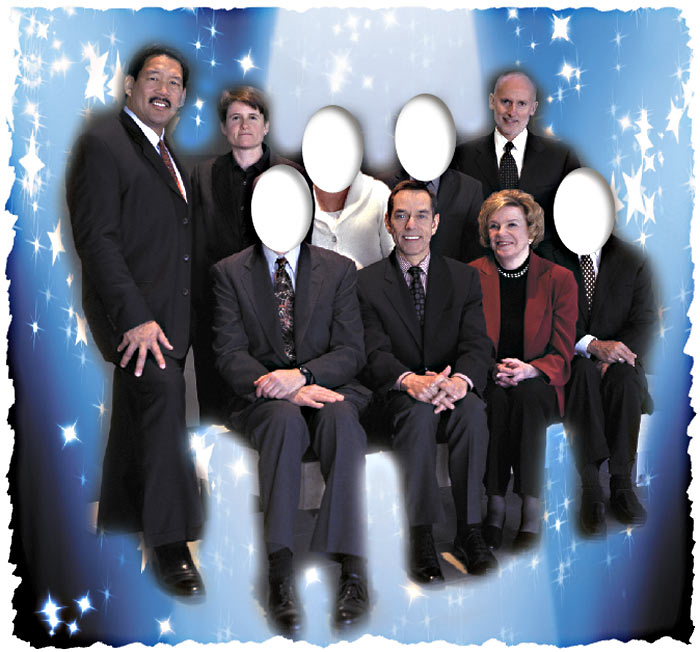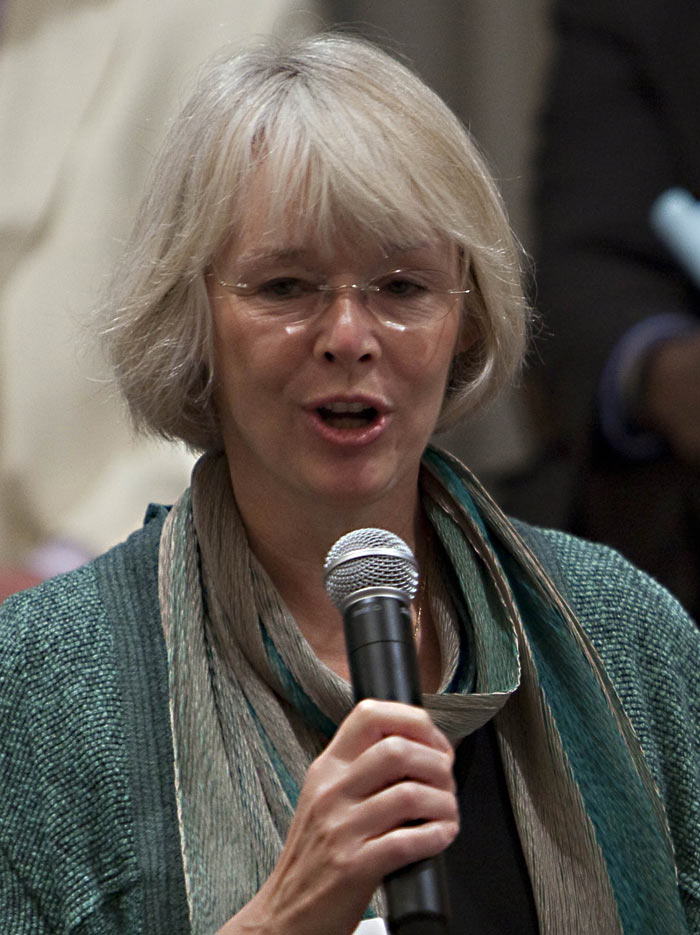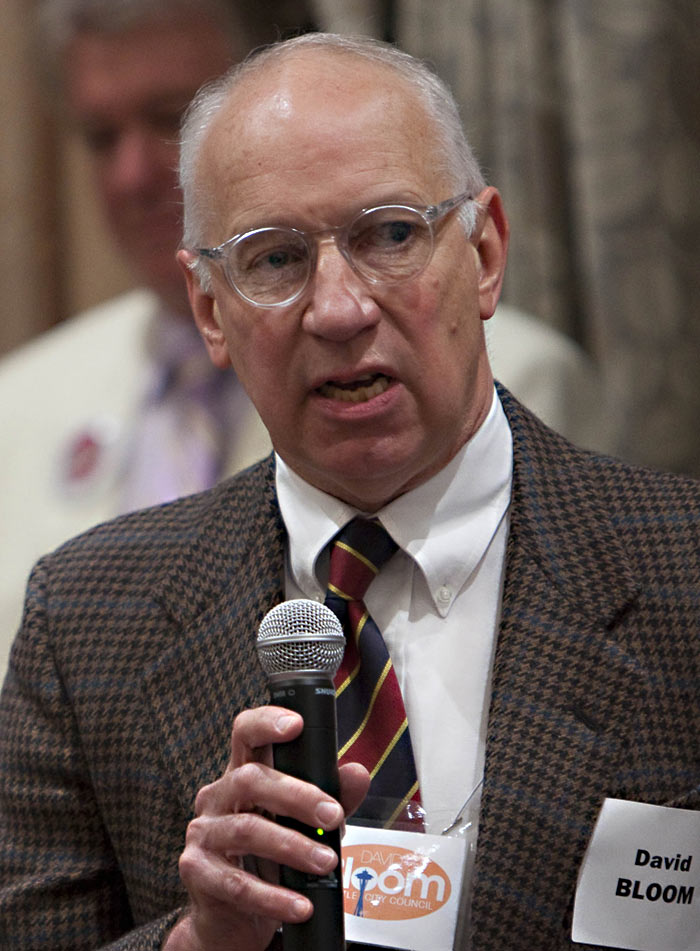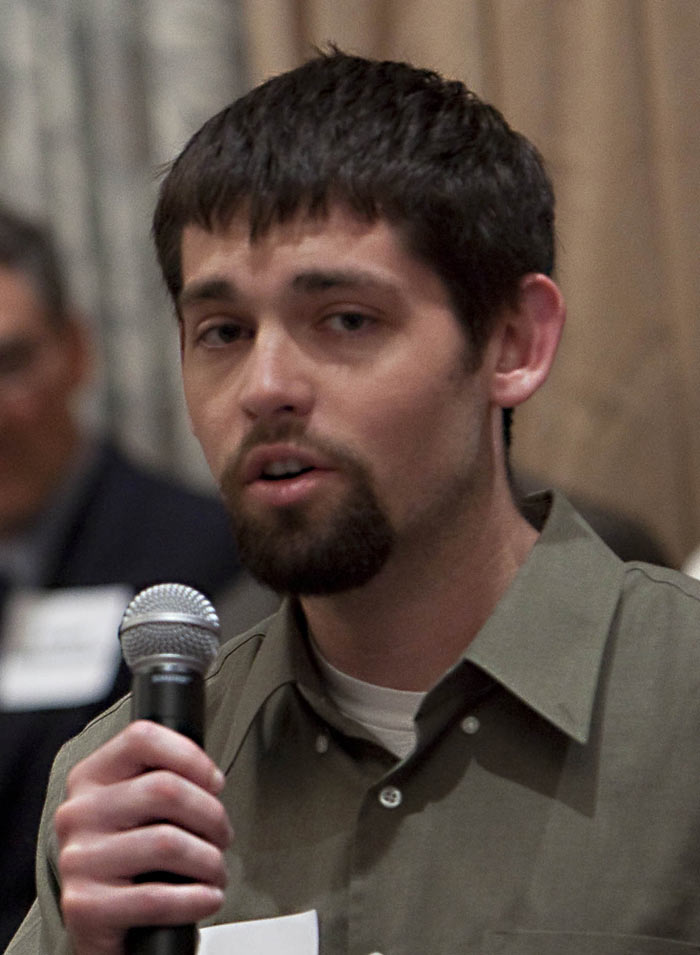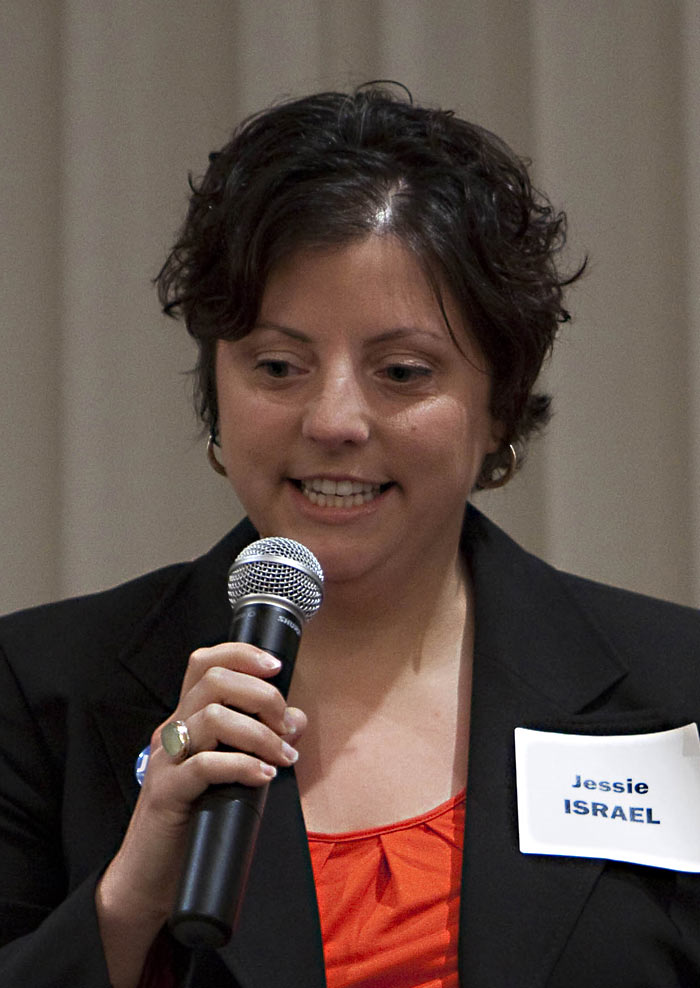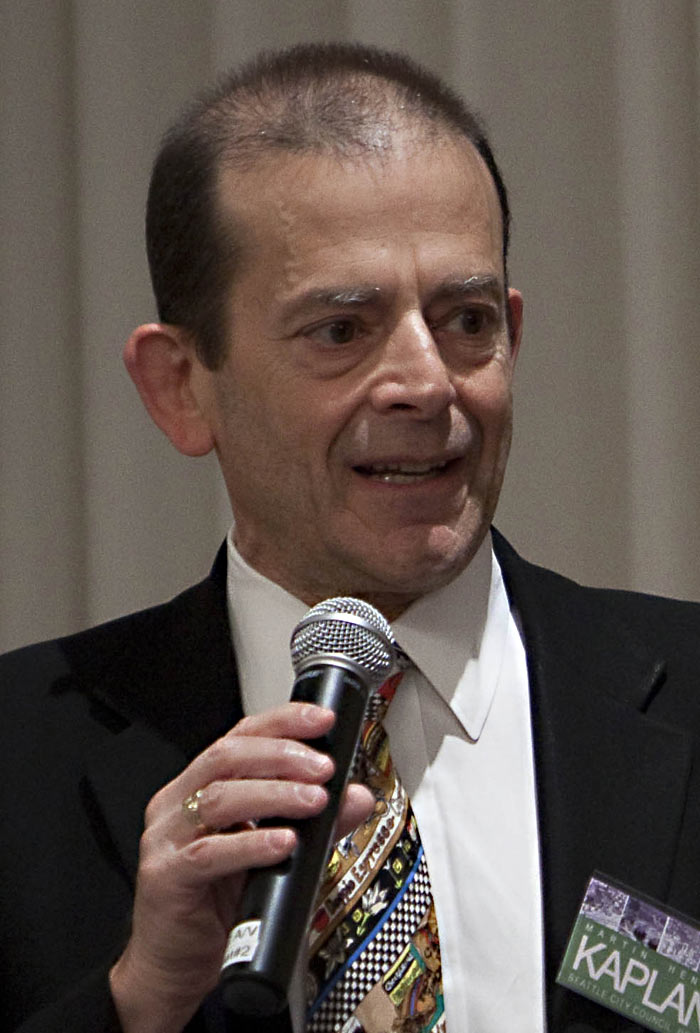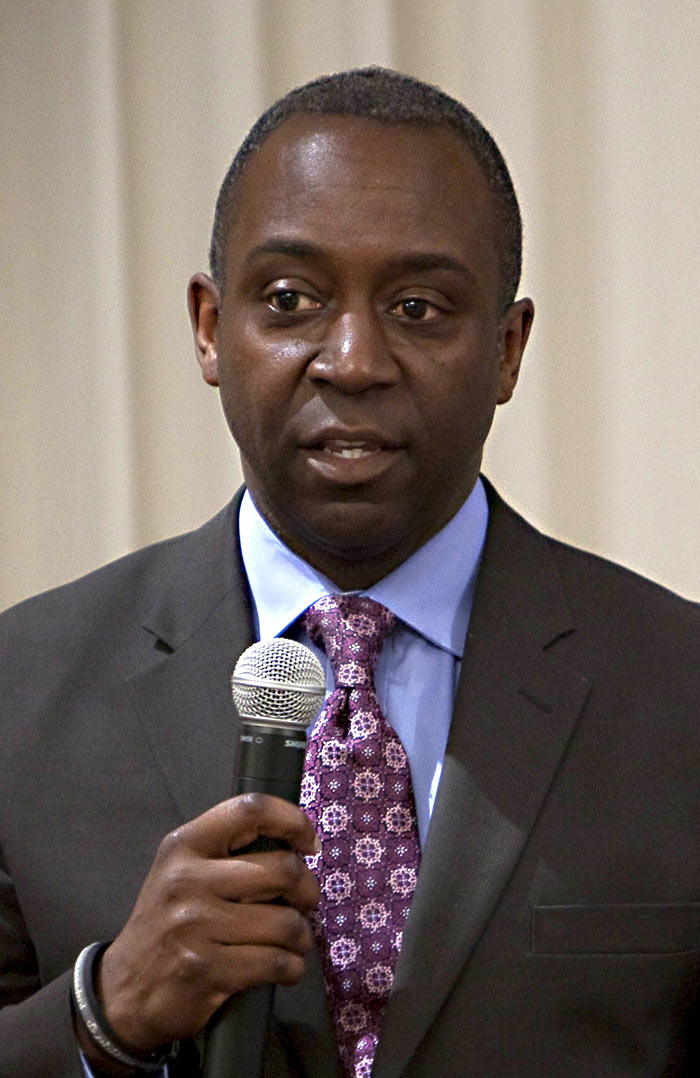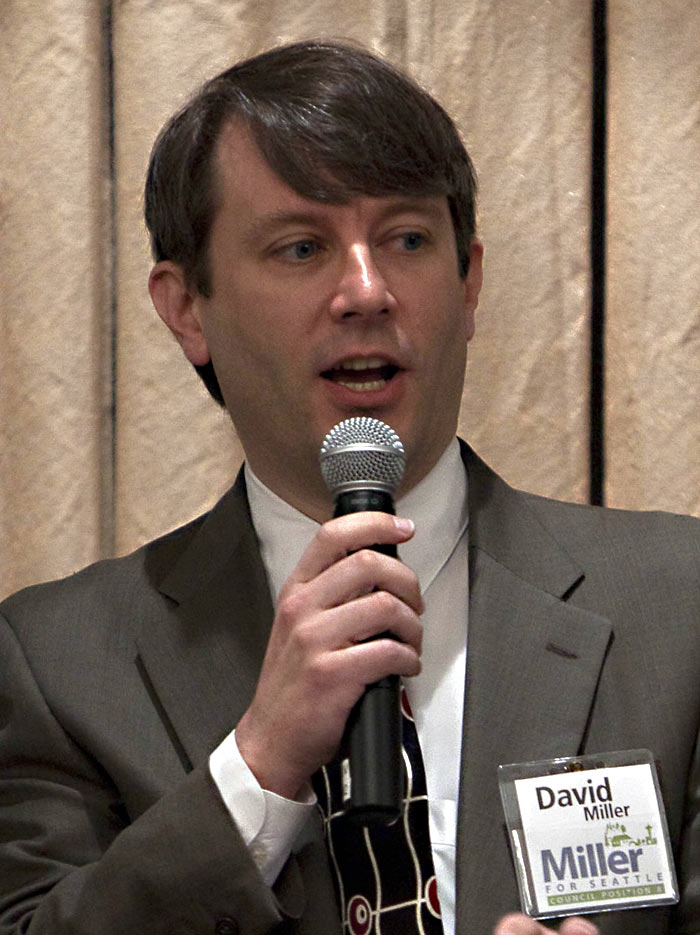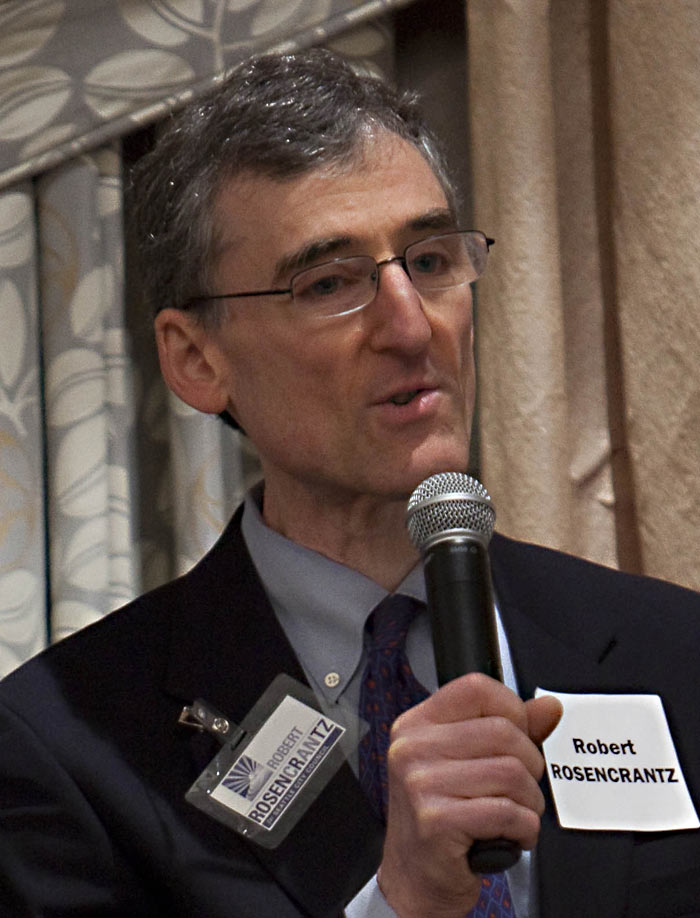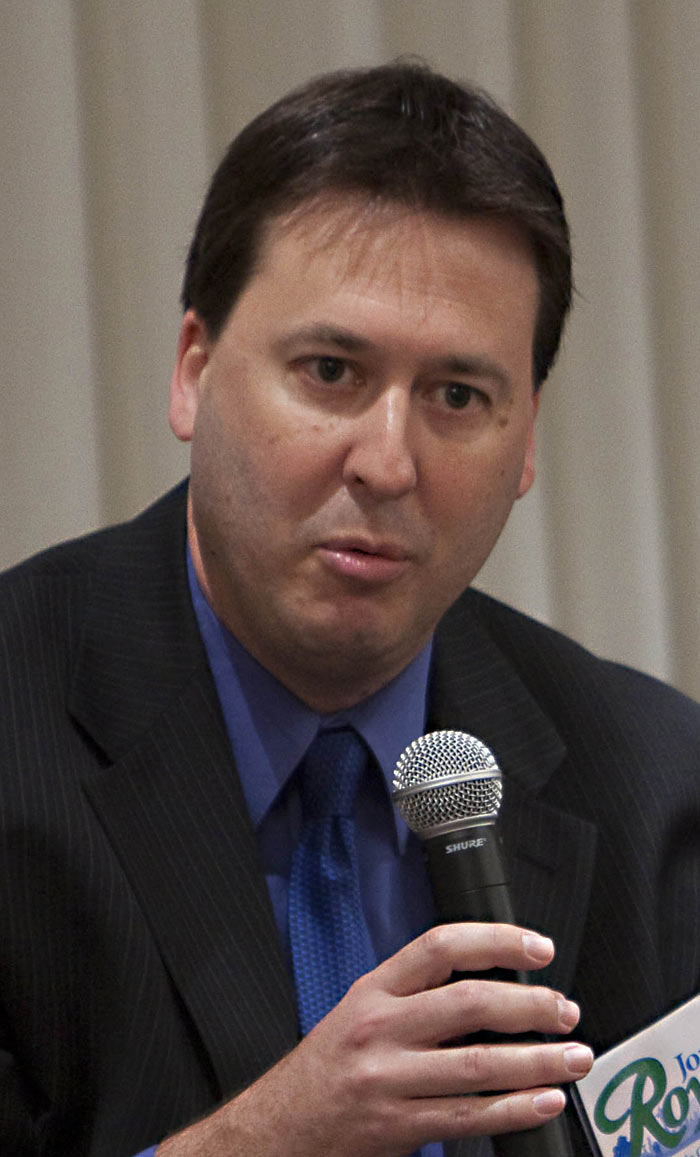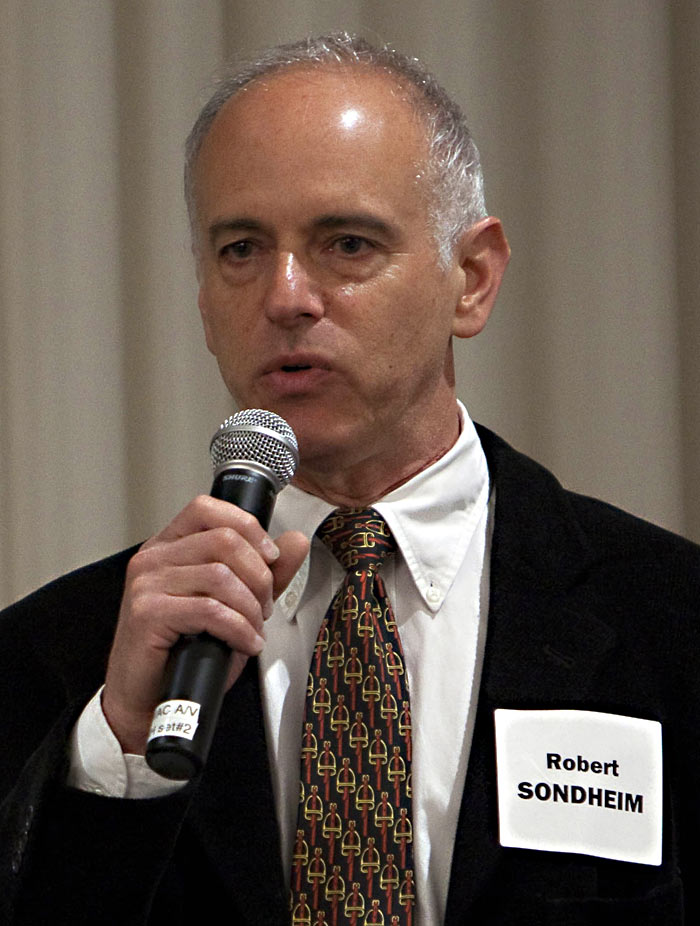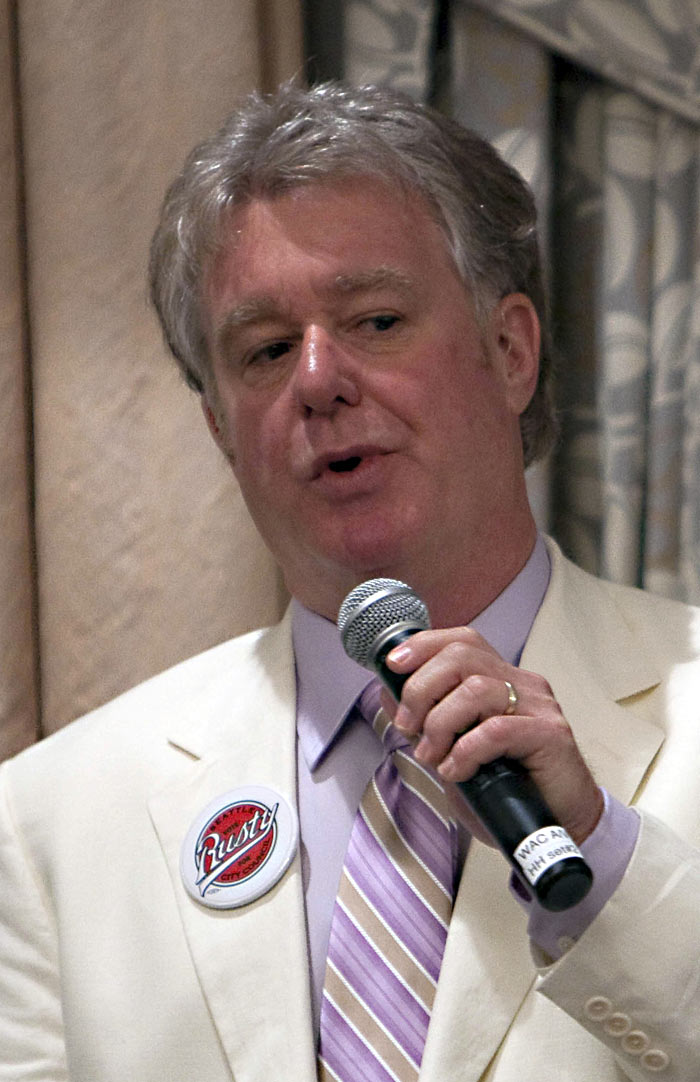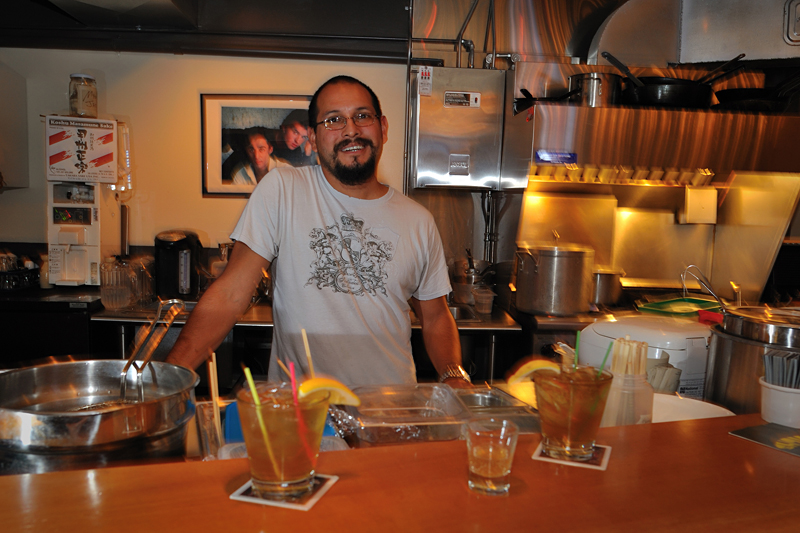With the country in deep recession, unemployment at dismal levels, and an inspiring community organizer in the White House, who wouldn’t want a gig that combines public service with four years’ job security? There’s barely a week left before the filing deadline, but Seattle City Council candidates are jockeying for position, creating alliances, and doing everything they can to stand out to you, the judges at home. Welcome to… Municipal Idol!
POSITION 2: RICHARD CONLIN, INCUMBENT
David Ginsberg: The All-American Dad
Ginsberg, 44, and his partner shop local, know their neighbors, and have adorable twins in first grade at Pathfinder Elementary in West Seattle. Ginsberg even works at a bank, just as nice middle-class men did in the 1950s.
But after putting in some serious volunteer hours for Obama, including a trip to the state convention, Ginsberg decided to get into politics full-time. And he’s not taking the easy route either, attempting to unseat a three-term incumbent who he claims has been ineffective.
The Issues: Having witnessed the massive layoffs by his employer, the bank formerly known as Washington Mutual—layoffs he managed to survive— Ginsberg thinks we’re too dependent on big companies. He wants the city to set up “small-business incubators” where entrepreneurs could go for advice and help with things like setting up payroll systems. Ginsberg says he would try to get the UW and other area colleges on board to provide space, expertise, and funding. Or, he says—waving his crossed fingers—”hopefully some stimulus money.” (The state received more than $4.1 billion from the federal stimulus package, and the Office of Financial Management is still sorting out who will get what and how local governments can apply for money.)
The Odds: Not good. As of April 30, Ginsberg had raised only $18,000. That’s not nearly enough to unseat an incumbent, especially when the public hasn’t been calling for Conlin’s ouster.
Confession Cam Analysis: Ginsberg is noticeably nervous during his interview—as many political novices would be. But get him talking about his kids and he’s in his element. Ginsberg might not get a lot of votes, but he and his adorable family will get a flood of invitations to barbecues this summer.
POSITION 4: JAN DRAGO, RETIRING
Sally Bagshaw: The Sneaky Grandma
With her blonde/grey bob, bright eyes, soft voice, and gentle smile, Sally Bagshaw is the grandma you always wanted. At the end of an interview with SW, she responded to a question about anything we might have missed by saying “You’ve done a very good job, this is a very thorough interview.” I hope we get cookies next! No, wait…get tough.
Bagshaw’s cuddly exterior belies her professional résumé. From 1999 to 2007, she ran the civil division of the King County prosecutor’s office, defending the county in litigation over everything from Metro to sewers. She’s a licensed pilot, and also sailed a 39-foot sailboat to Bora Bora last year. Bagshaw was hand-picked by Jan Drago, who retired, then decided to challenge Greg Nickels for mayor. Anyone taking her on not only faces a candidate with almost incumbent-like backing, but the risk that voters will turn on them if they attack her too aggressively.
The Issues: Bagshaw, 58, says she emphasized mediation during her time as a litigator, and could bring the warring city council and mayor together. Her conflict-resolving nature may explain why it’s nearly impossible to get her to say anything specific on what the city council should do about the problems facing Seattle. To combat the rise in gang violence, she wants to encourage more neighborhood watch groups. To address unemployment, she wants to see entrepreneurs work together to save on administrative costs.
The Odds: As any reality-show veteran knows, alliance-building is the key to victory. Liberal activists may like the fact that her husband, Brad Bagshaw, was on the legal team representing eight gay and lesbian couples in a 2004 case seeking marriage recognition in King County (a case they lost). The center-right is also on board, with Republican Prosecuting Attorney Norm Maleng’s widow, Judy, on Bagshaw’s steering committee.
Confession Cam Analysis: She’s incredibly likable to everyone not running against her. Opponents will have to point out her lack of any substantive policy proposals in the politest manner possible.
David Bloom: The Scruffy World-Saver
Like another well-known politician, David Bloom has significant experience as a community organizer. He even looks the part, showing up for an interview with the sleeves of his button-down plaid shirt rolled to the elbows and a Real Change button on his jacket.
Now 67, Bloom fought redlining in the Central District in the 1970s. Back then he helped found the Seattle Displacement Coalition to advocate for low-income housing projects; the Downtown Emergency Service Center, which provides meals and runs a short-term shelter; and Common Ground, a group that provides administrative and management help to contractors working on low-income housing projects. And as an ordained minister, he worked until 1994 in various positions with the Church Council of Greater Seattle—a group most recently active in finding new spots for the roaming encampment called Nickelsville, currently located at a church south of Rainier Beach.
The Issues: He’d like to spend more on housing and services—no surprise there—and less on big-ticket items. He wants the city to find a cheaper way to deal with Mercer Street than the current $204 million proposal, which includes adding lanes and a wide center median, and put the savings into low-income housing.
The Odds: Bloom has a strong appeal to Seattle’s conscience. His hefty list of backers includes a who’s-who of local social-service organizations and other progressive groups. That may help to overcome his financial disadvantage; he currently has roughly half the cash Bagshaw does.
Confession Cam Analysis: There are always rumpled community activists, often from the fringes, running for office. But Bloom understands that he needs money and backers to win office, and he’s recruiting both at a steady clip. He’s not just gunning for a temporary soapbox; he’s a serious contender.
Josh Caple: The Earnest Young Man
Caple says he’s in this race for one reason—he thinks the city mishandled its budget cuts. Last year, facing a $40 million budget deficit, the city cut smaller human-service programs in favor of increasing the number of shelter beds and continuing an emergency food program. Caple, who works for a partly city-funded program that helps the elderly with walks and shopping, says one of his program’s partner groups lost a $20,000 grant.
Caple, 32, comes from a family marked by domestic violence, and during college he started speaking around the state on the impact it had on his family and his life. Since then, he says, working in social services has been his passion.
The Issues: Caple says that if the city can’t restore the funding it cut, it should set up a database to connect businesses with nonprofits. As to how exactly that would be administered and paid for, he says he still needs to learn how the city’s budget works. Same with other issues: For instance, he says the city should work to get people out of their cars. He knows the buses are controlled by King County, so he isn’t sure what role the city can play to improve public transit, just that it should play one.
The Odds: Caple says he offers the perspective that comes with being a young renter from Columbia City. Realistically, Bagshaw and Bloom have this locked down for the August primary, but it can’t hurt to hear what Caple has to say.
Confession Cam Analysis: He has bright blue eyes and says things like: “We need to continue to make sure [people with disabilities] have a voice, because who’s going to voice them, who’s going to stand up for them?” With his work, he backs up his claims to care about people at the margins. He might not win, but his heart is in the right place.
Dorsol Plants: The Little-Known Military Kid
The youngest contestant, Plants is a 24-year-old Army veteran who enlisted about a year after 9/11 and was part of the initial invasion of Iraq. After finishing a second tour in the Middle East, this West Virginia native moved to West Seattle and immediately got involved in neighborhood politics, fighting a proposal floated by the city to build a new jail in his neighborhood and joining the 34th District Democrats, where he serves on the board. By day he works at the Family and Adult Service Center to get homeless vets into jobs.
The Issues: Plants condemns the Nickels administration’s homeless-camp sweeps, and thinks we should spend more money on treatment for drug and mental-health issues, rather than on new jails. But when it comes to actually managing city human services, public safety, or the ailing budget, Plants readily admits he has a lot to learn.
The Odds: Plants doesn’t have a consultant or alliances with other politicians to give him any name recognition; most are already committed to the higher-profile Bagshaw and Bloom. He also doesn’t have the money to gain name recognition on his own.
Confession Cam Analysis: He has a hint of a twang, and adorable ears that stick out a little. Bloom is Plants’ competition, but is also a fan of his enthusiasm. “He’s got some good things to say,” Bloom says.
POSITION 6: NICK LICATA, INCUMBENT
Jessie Israel: The Perky Lefty
Jessie Israel embodies liberal Seattle values. She’s been a member of a long list of woman-focused political groups; did a tour with the Peace Corps in Guinea, West Africa; and now at age 35 manages marketing and outreach projects for the King County Parks Department. It’s an impressive start to her résumé, but Israel runs into the problem of needing a concrete public-policy achievement on which to hang her campaign. She says she’s had to be creative in the wake of Tim Eyman initiatives gutting parks funding, pointing to a highly lucrative lease agreement with Cirque du Soleil, which semi-regularly performs in Redmond’s Marymoor Park. She even posted to her Web site part of a Seattle Times editorial on the Cirque agreement. But the editorial never mentions Israel, and the first deal between King County and the fantasy/acrobatic troupe was inked before she came on board. She manages those kinds of deals now, but she didn’t create them.
The Issues: Like some of her fellow candidates, Israel seems mostly to be running on change for its own sake. “Council member Licata has served with integrity, but it’s been 12 years, and in my mind 12 years is long enough,” she says. She wants to use stimulus money (naturally) to set up a low-interest loan fund to help individuals and small businesses buy solar panels and the like.
The Odds: As a community activist who loves green spaces, Israel will have a hard time creating enough of a distinction between herself and Licata to pull his supporters. As you listen to her speak, you find yourself thinking “She should be working for Licata, not running against him.”
Confession Cam Analysis: Israel is young and enthusiastic. She’s the kind of person you want leading your local neighborhood association—she’d organize the cleanup days and get everyone excited about them. And if Licata ever retires, they’re ideologically synched up enough that he might even back her.
Martin Kaplan: The Plain Old Common-Sense Business Guy
Kaplan, an architect, is pretty much running as the anti-Licata. During an interview, he repeatedly mentions the importance of a current plan to fix the “Mercer Mess,” which Licata has opposed. Kaplan sits on the Seattle Planning Commission, which has been pushing the proposed design. Kaplan accuses Licata of opposing it mostly out of irrational, classist anti–Paul Allen sentiment. He makes the same accusation about the Sonics, saying he would have voted to redo Key Arena for the sake of keeping the Sonics around. Licata led the opposition to that initiative as well.
The Issues: More than once during an interview, Kaplan brings up the decision of luxury retailer Neiman Marcus to locate its new store in Bellevue rather than downtown Seattle. Kaplan thinks the city is keeping out those kinds of businesses through various taxes he says need to go. For instance, in 2007 the city started charging businesses $25 a year for each of their employees. Then last year the city instituted an annual tax on businesses of $1.56 per square foot they occupy—even those leasing space. Such taxes discourage big retailers from moving here, Kaplan says, and he’d push to get rid of both.
The Odds: Four years ago, Licata won by the biggest margin of any city council member, getting more than three-quarters of the ballots. People love him, with his fedora and corduroy chinos. He’d have to get caught on a spa day with Paul Allen for his devotees to jump ship. But Kaplan’s got some fundraising power, hitting $28,000 by the end of April, compared to Licata’s $58,000. He’s being backed by real-estate investors and developers as well as by members of the McCaw family (for whose matriarch, Marion Oliver McCaw, the city’s opera house on Mercer Street is named).
Confession Cam Analysis: Kaplan, 60, is the no-nonsense, old-fashioned Luddite of the race. His Web site has been down for weeks, and he doesn’t Twitter or have a Facebook account, and he has no intention of apologizing for that. “Maybe it’s because I’m not 16, and maybe that’s a good thing when you’re running for city council,” he says. Licata is a little long in the tooth too, but he’s writing to the kids on the Capitol Hill Block Party’s Facebook wall.
POSITION 8: RICHARD MCIVER, RETIRING
Bobby Forch: The Smooth Mover
Forch is an African-American resident of the Central District, which makes him a demographic natural to replace the outgoing Richard McIver. But unlike McIver, who made a name for himself serving on local community boards before being appointed to replace John Manning on the council in 1997, Forch is a political unknown. He currently works in an advisory capacity for the city’s Department of Transportation. His job, essentially, is to bring in potential contractors and help them through the bidding process. It’s the latest stop in a 15-year career of city employment, which started on a work crew putting up street signs.
The Issues: Forch claims that at SDOT, he’s helped get more contracts to small businesses and made the management of those contracts more efficient. He says he achieved the former by requiring general contractors to spread around at least 80 percent of the work on a project to subcontractors. The latter he claims to have achieved by cutting out steps between the people who get invoices and those who write checks. He thinks the same can be done in other city departments. He’s basically running on a platform of “cutting red tape,” a phrase he uses repeatedly.
The Odds: Having just signed up this month, Forch is late to a race that’s already crowded, putting him behind in both financial and political support. McIver himself has already endorsed another candidate (see below). Also, running on the performance of SDOT may not be the winningest strategy at present.
Confession Cam Analysis: Forch’s biggest advantage is his public persona. At a young-looking 53, he’s easily the best-dressed candidate in any local race right now. The man can wear a suit. And thanks, perhaps, to studying a little theater in college, he’s got presence to match.
David Miller: The Well-Appointed Neighborhood Activist
“They use NIMBY as a pejorative term,” Miller says. But to him it isn’t. Since 2007, Miller has been fighting townhome builder Prescott Development over a grove of trees in Maple Leaf known as Waldo Woods. The city approved Prescott’s plan to level 100 of the big trees on the property, and shot down an appeal by Miller and the community council he leads. Miller is now waiting on a judicial ruling after he took the fight to King County Superior Court last March. He also sat on the committee that wrote last year’s parks levy, which passed with 59 percent of the vote.
The Issues: Miller wants to have more of a say in future development plans. He opposes the proposal to expand the streetcar beyond Lake Union, saying he’d rather see the city spend cash on things like hiring additional police officers. And he wants to keep a lid on upzoning in the neighborhoods, and create incentives for better townhome design.
The Odds: In a very crowded race, it’s going to be difficult to stay in the spotlight. He shares endorsements with one of his competitors, and he’ll have a tough time snagging the tree-hugger vote, given that he’s running against the chair of the local chapter of the Sierra Club (see below).
Confession Cam Analysis: Miller is the CEO of Biotech Stock Research, a company that specializes in providing investment analyses of companies in the biotech sphere, and he comes off as the consummate businessman: He wears a suit and has a haircut John Edwards could get behind. But it might not hurt to dye that hair pink, just to have a way to stand out in this packed field.
Mike O’Brien: The Environmentalist Your Mom Is Crushing On
O’Brien walks into the conference room for his interview and sets his commuter bike helmet, complete with rearview mirror and Obama sticker, on the table. Apparently he’s the only person on Earth whose “helmet hair” comes out with a slight tousle that actually makes him look better. Add a strong chin, great teeth, and a light tan to sincere environmentalism—he’s chair of the local Sierra Club—and suddenly your college self, who just couldn’t help being totally mad for the guy organizing a WTO protest, is back with a vengeance. What might surprise some people is that O’Brien’s day job is anything but hippy-dippy. He got a bachelor’s in economics from Duke and an MBA from the University of Washington. He’s now the chief financial officer for a local law firm.
The Issues: O’Brien hates the current tunnel plan. He preferred an earlier proposal to build a surface street, add access to I-5, and put more money into expanding various forms of public transit. He says that option would have cost about $1 billion less and helped alleviate Metro’s funding shortfalls. He attended Gov. Gregoire’s signing ceremony for the viaduct-replacement legislation to protest it. O’Brien basically wants the city to spend less overall on projects like the viaduct and Mercer Street; with the savings, he proposes a plan, similar to Israel’s, whereby people get loans from the city for energy-efficiency projects for their homes. O’Brien also says expanding low-income housing is one of his top priorities, and he backs the mayor’s proposed new levy.
The Odds: O’Brien is likely to lock down the environmental vote. He can navigate business circles too, but opposing the tunnel may mean losing support from members of the Greater Seattle Chamber of Commerce and the Downtown Business Association. Still, with anti-Nickels sentiment running so high, that might not be a bad thing.
Confession Cam Analysis: He’s the political equivalent of being both a high-school quarterback and captain of the Science Olympiad team. The nerds love him, the jocks love him, the stoners love him, the principal loves him. Will those warm feelings turn into actual votes?
Robert Rosencrantz: The Repeat Contender
To explain his third attempt at winning a Seattle City Council seat (he lost previous primaries to Jean Godden, who unseated Judy Nicastro in 2003, and Dwight Pelz, who lost to incumbent McIver in 2005), Rosencrantz points to his childhood. At age four he developed Perthes disease, a hip condition that put him on crutches for a year. He says it inspired in him an overwhelming desire to become a champion athlete. His sport of choice: race-walking. At age 15 he lost the junior national championship race, then the next two after that. On his fifth attempt, in 1975, the last year he was eligible, Rosencrantz was up against a multi-year winner. Rosencrantz wasn’t considered a likely challenger, he says, but he won—and in the process, he claims, broke the national junior record. Rosencrantz, now 53, owns and manages four apartment buildings with a total of 36 units. [This story has been corrected. It originally stated that Rosencrantz won the national championship in 1974 on his fourth attempt.]
The Issues: Rosencrantz talked extensively during a half-hour interview about parking meters. He wants to let neighborhoods decide where to put them, and give them a cut of the revenue. Right now they’re controlled by SDOT, “and I think that’s wrong,” Rosencrantz says. It was the only specific he offered after making a more general statement that more power needs to be given to neighborhoods. He also echoes Kaplan’s sentiments about making Seattle more business-friendly, starting with axing the taxes on square footage and employees. After that he gets pretty random, bouncing between selling ads on public toilets to harnessing tidal energy, neither of which is part of any specific plan. Basically, if elected, “I’ll come up with lots of ideas, many of them totally nuts,” he says. “Well, I shouldn’t say that.”
The Odds: Rosencrantz has served on the right boards and organizations from which to cull supporters, including Seattle Tilth and the Church Council of Greater Seattle’s Interfaith Task Force on Homelessness. He’s picked up some big endorsements, notably from exiting incumbent McIver. And he was a favorite of the Seattle Times editorial board in 2003.
Confession Cam Analysis: He’s a little disheveled, his glasses a touch askew. That may help combat any anti-landlord prejudice. Working against him: a tendency to refer to himself in the third person.
Jordan Royer: The Guy With The Famous Dad
Royer’s father Charles led Seattle from 1978 to 1990, when he retired as mayor. “He’s my number-one advisor,” Royer junior says. Jordan Royer now works as a lobbyist for the Pacific Merchant Shipping Association, a trade group for container-shipping companies and cruise lines doing business in Washington and California. He previously served in both the Paul Schell and Nickels administrations as an advisor, first on strategic planning and neighborhoods, later on public safety.
The Issues: The current council is wasting time on things like whether or not to place fees on plastic bags, says Royer, 43. He wants to see more cops on the street, seamless trash collection (there have been some hiccups under the city’s new recycling program), and fewer burned-out streetlights. “These are the basic government services that we have to get right,” he says. More than once he mentions that it took him and his neighbors two years of dealing with the city to get speed bumps installed in their neighborhood. Even so, he says he’d vote to cut more jobs from the city budget, especially at the management level. He’s also one of the candidates on board with eliminating taxes on business square footage and employees.
The Odds: With his connections, early money poured in, but the flow has since slowed. Family dynasties don’t scare Seattle voters, as evidenced by Peter Steinbrueck, but it will take more than his name to get Royer into the seat.
Confession Cam Analysis: He speaks fluent parent. Chatting over coffee, he worries about the expense of raising kids in the city, the quality of public schools, and keeping minors occupied during the summer. The city council might not have a direct role in such matters, but everyone with rugrats thinks about them a lot. Good empathy points.
Robert Sondheim: The Curmudgeonly Shopkeeper
Sondheim, owner of the Rosebud on Capitol Hill, sweeps the sidewalk outside his restaurant every morning. “Graffiti makes me nuts,” he adds.
The Issues: Sondheim doesn’t think we have a strong enough police presence or do enough to support the arts, though he doesn’t really have a specific plan to get more money to any of those things.
The Odds: He transferred the $1,854 he had left over from his 2007 run for Jean Godden’s seat, and hasn’t raised a dime since. He says rather than aggressively campaigning now, he’s biding his time to see what everyone else is doing—an odd strategy for winning.
Confession Cam Analysis: He isn’t likely to survive the primary. Still, you might want to adopt him as your crotchety but lovable grandfather, then join him for eggs benedict and bitching about people who don’t sweep their sidewalks.
George “Rusty” Williams: The Guy Who Keeps Talking About His Old Band
Williams’ Web site looks like the home page of a diner, and includes as much detail on his former band, Bighorn, a group that hit its prime in the 1970s, as it does on his work history or political credentials. “At one point Bighorn put up bigger numbers at Seward Park and the Seattle Center than Nirvana. Our main competitor was a band called Heart,” he claims on the site. Despite this, no Bighorn artifacts are on exhibit at EMP. (Probably an oversight.) The only thing he talks about more than his band is his mother, the late Jeanette Williams, a former Seattle City Council member. He’s been lobbying the council to name the West Seattle Bridge after her.
The Issues: Williams is the most vocal opponent among the candidates of a levy sponsored by the mayor to build more low-income housing. He says this is the wrong time to ask people in the city to raise their taxes.
The Odds: After a business career that took him from selling advertising for Yellowpages.com to being a realtor for commercial firm Lange-Peizer, Williams was in a position to drop $20,000 of his own money into the race. He doesn’t have many donors, but has picked up an endorsement from former governor Booth Gardner.
Confession Cam Analysis: Williams dresses like a stand-up comic—arriving for an interview in jeans, a sport coat, and a pressed white shirt with the top two buttons undone. Between that and his days-of-music-glory chatter, it’s hard to take him seriously.
